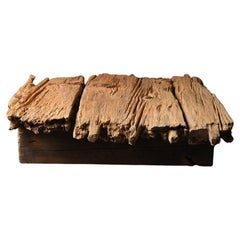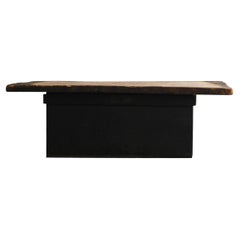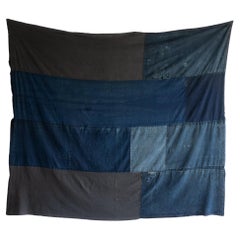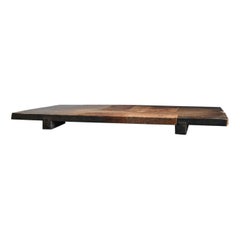Want more images or videos?
Request additional images or videos from the seller
1 of 20
Japanese antique wabi-sabi wooden low table / 1800s / side table
$1,000List Price
About the Item
- Dimensions:Height: 9.34 in (23.7 cm)Width: 35.83 in (91 cm)Depth: 13 in (33 cm)
- Style:Meiji (Of the Period)
- Materials and Techniques:Cedar,Woodwork
- Place of Origin:
- Period:
- Date of Manufacture:1800s
- Condition:Repaired: There was a crack in the reinforcement between the legs on the right side of the front, so we glued it and repaired it. Please see the detailed image.
- Seller Location:Sammu-shi, JP
- Reference Number:1stDibs: LU5487244848192
About the Seller
5.0
Platinum Seller
Premium sellers with a 4.7+ rating and 24-hour response times
Established in 2015
1stDibs seller since 2020
1,632 sales on 1stDibs
Typical response time: 5 hours
Authenticity Guarantee
In the unlikely event there’s an issue with an item’s authenticity, contact us within 1 year for a full refund. DetailsMoney-Back Guarantee
If your item is not as described, is damaged in transit, or does not arrive, contact us within 7 days for a full refund. Details24-Hour Cancellation
You have a 24-hour grace period in which to reconsider your purchase, with no questions asked.Vetted Professional Sellers
Our world-class sellers must adhere to strict standards for service and quality, maintaining the integrity of our listings.Price-Match Guarantee
If you find that a seller listed the same item for a lower price elsewhere, we’ll match it.Trusted Global Delivery
Our best-in-class carrier network provides specialized shipping options worldwide, including custom delivery.You May Also Like
Japanese Antique Wabi-Sabi Low Table Edo period 1800s-1860s / Side Table
Located in Chōsei District Nagara, JP
This is an old Japanese low table, crafted during the Edo period (1800s–1860s). It is a rare piece of furniture that has survived through the centuries to the present day. Made of su...
Category
Antique Mid-19th Century Japanese Edo Side Tables
Materials
Cedar
$1,200
H 9.85 in W 34.45 in D 9.06 in
Japanese Antique Wooden Box / Side Table Sofa Table / 1868-1912s Wabi-sabi
Located in Iwate-gun Shizukuishi-cho, Iwate Prefecture
This is an old wooden box made in Japan.
It is thought to date from around the Meiji period and is made of cherry wood.
It is one of the folk tools used in early modern Japan, and ...
Category
Antique Late 19th Century Japanese Meiji Side Tables
Materials
Wood, Cherry
$800
H 16.54 in W 32.88 in D 19.49 in
Wooden Low Table, Japanese Antique, Wabi-Sabi, Mingei
Located in Katori-Shi, 12
This is a wooden antique low table from the Meiji era.
It was used as a working table for woodworkers of the time.
It is made of high quality Japanese zelkova wood.
The grain of zel...
Category
Early 20th Century Meiji Coffee and Cocktail Tables
Materials
Wood
Wooden Low Table, Japanese Antique, Wabi-Sabi, Mingei
Located in Katori-Shi, 12
We will introduce a low table that exudes the charm of the Meiji era.
The low table was loved by craftsmen as a "cutting stand" during the Meiji era.
Cherry wood with a rich textur...
Category
Early 20th Century Meiji Coffee and Cocktail Tables
Materials
Wood
Wooden Low Table, Japanese Antique, Wabi-Sabi, Mingei
Located in Katori-Shi, 12
This low table was loved by craftsmen as a "workbench" during the Meiji period.
The wood grain, which has deepened with age, is reminiscent of the warm lifestyle of that time.
A cu...
Category
Early 20th Century Japanese Meiji Tables
Materials
Wood
Wooden Low Table, Japanese Antique, Wabi-Sabi, Mingei
Located in Katori-Shi, 12
Introducing our exquisite low table, a stunning example of the beauty found in wabi-sabi and traditional craftsmanship. Originally used as a sewing workbench, this piece carries a ri...
Category
Early 20th Century Meiji Coffee and Cocktail Tables
Materials
Wood
Japanese Antique Storage Box 1860s-1900s / Nightstand Side Table Wabi Sabi
Located in Chōsei District Nagara, JP
This is a wooden storage box made in Japan. It was made during the Meiji period (1860s-1900s) and has a long-standing taste and quiet presence.
The material is cedar wood. This wood ...
Category
Early 20th Century Japanese Meiji Side Tables
Materials
Cedar
$900
H 14.18 in W 29.93 in D 13.39 in
1800s - 1860s Edo Japanese antique chestnut low coffee table wabi sabi primitive
Located in 常陸大宮市, JP
New finds from Kura (traditional style warehouse) in Yamagata pref., Tohoku area, Japan.
This antique low writing desk is a product of 1800s - 1860s (late Edo era), estimate from the style and conditions.
Made of thick, sturdy single solid chestnut wood boards. Can be used as coffee table, display table etc.
Yamagata pref. is known to rich woodcraft cultures. The most known products are bold but elaborate, premium Tansu furnitures...
Category
Antique Late 19th Century Japanese Edo Coffee and Cocktail Tables
Materials
Wood, Chestnut
$1,350
H 9.45 in W 36.42 in D 13.78 in
Japanese Antique Low Table, Wabi Sabi
Located in Katori-Shi, 12
This is an antique wooden low table from the Meiji period (1986-1912).
The curved legs are beautiful.
It was used as a workbench by craftsmen at the time.
The material is high-qual...
Category
Early 20th Century Japanese Meiji Antiquities
Materials
Wood
Antique Wooden Low Coffee Side Table in Pine Produced in Sweden early 1800s
Located in Stockholm, SE
Rare wooden side / coffee butcher table in a primitive and wabi sabi style in pine wood produced in Sweden around 1820s. In good original condition. Very decorative with a lot of cha...
Category
Antique 1820s Swedish Scandinavian Modern Side Tables
Materials
Pine
$7,039
H 17.72 in W 29.53 in D 27.17 in
More From This Seller
View AllJapanese Wabi Sabi Antique Wooden Low Table/1800-1920/Sofa Table
Located in Sammu-shi, Chiba
This is a low table made from a part of a rare wooden ship “Kitamae-bune” obtained in Kanazawa, Hokuriku region. Kitamae-bune was an important trading ship that connected northern an...
Category
Antique 19th Century Japanese Meiji Sofa Tables
Materials
Oak, Pine
Japanese antique wooden low table/1868-1920/Wabi-sabi coffee table
Located in Sammu-shi, Chiba
This item is a stately Wabisabi wooden low table with a wooden box from the end of the Edo period to the Meiji period (1800-1912) in Japan as the table base, combined with an old oak...
Category
Antique Late 19th Century Japanese Meiji Sofa Tables
Materials
Oak
Japanese Antique Rag "BORO" 1800s-1860s / Abstract Art Wabi Sabi
Located in Sammu-shi, Chiba
This is an exceptional example of a Japanese *BORO* textile, dating from the late Edo period (1800s–1860s). Carefully preserved over generations, it embodies both the resourcefulness...
Category
Antique Mid-19th Century Japanese Edo Tapestries
Materials
Fabric
Japanese antique wooden low table covered with washi paper / Wabi-sabi workbench
Located in Sammu-shi, Chiba
This wooden low table is a wonderful item with the charm unique to Japanese antiques. It was originally used as a work board and was probably used for a long time as a tool for cutti...
Category
Antique Late 19th Century Japanese Meiji Sofa Tables
Materials
Wood
Japanese antique wooden sofa table/Late 19th century/Wabi-sabi low table
Located in Sammu-shi, Chiba
This is a board and a wooden box that were used in Japan from the Meiji period to the early Showa period.
These two can be combined to make a low table.
The tabletop is made of eithe...
Category
Antique Late 19th Century Japanese Meiji Sofa Tables
Materials
Cedar
Japanese Antique Primitive Low Table 1860s-1920s / Wabi Sabi
Located in Sammu-shi, Chiba
This is a very old low table made in Japan.
Its design is simple—consisting of a single slab of wood placed atop a tree stump.
The materials used for both the top and base date back ...
Category
Early 20th Century Japanese Meiji Sofa Tables
Materials
Chestnut
Recently Viewed
View AllMore Ways To Browse
Chinese Painted Chest
Chinese Pewter
Christ With Child
Colonial Sri Lankan
Copper Cross
Danish Mid Century Ring
Edith Brown
English Mason
French Aubusson Chair
Glass Candy Bowls
Goat Leg
Hand Painted Wallpaper Panels
Henry Link Vintage Furniture
Hjorth Bornholm
Hollywood Regency Leopard
Ibis Bird
Iron Wall Hook
Italian Bas Relief



